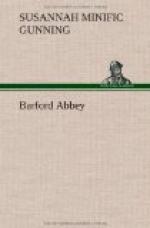Oh, Risby! my heart is breaking; for once let it be said a man’s heart can break.—Whilst he rav’d, whilst his sorrows were loud, there was some chance; but now all is over. He is absolutely dying;—death is in every feature.—His convulsions how dreadful!—how dreadful the pale horror of his countenance!—But then so calm,—so compos’d!—I repeat, there can, be no chance.—
Where is Molesworth? I heard him say as I enter’d his apartment: come to me, my friend,—holding out his hand—come to me, my friend.—Don’t weep—don’t let me leave you in tears.—If you wish me well, rejoice:—think how I should have dragg’d out a miserable number of days, after—oh, George! after—Here he stopp’d.—The surgeon desir’d he would suffer us to lift him on the bed.—No, he said, in a faultering accent, if I move I shall die before I have made known to my friend my last request.—Upon which the physician and surgeon retir’d to a distant part of the room, to give him an opportunity of speaking with greater freedom.
He caught hold of my hand with the grasp of anguish, saying, Go, go. I entreat you, by that steady regard which has subsisted between us,—go to the unhappy family:—if they can be comforted; ay, if they can, you must undertake the task.—I will die without you.—Tell them I send the thanks, the duty, of a dying man;—that they must consider me as their own. A few, a very few hours! and I shall be their own;—I shall be united to their angel daughter.—Dear soul, he cried, is it for this,—for this, I tore myself from you!—But stop, I will not repine; the reward of my sufferings is at hand.
Now, you may lift me on the bed;—now, my friend, pointing to the door,—now, my dear Molesworth, if you wish I should die in—there fainted.—He lay without signs of life so long, that I thought, all was over.—
I cannot comply with his last request;—it is his last I am convinc’d;—he will never speak more, Risby!—he will never more pronounce the name of Molesworth.
Be yours the task he assign’d me.—Go instantly to the friends you revere;—go to Mr. and Mrs. Powis, the poor unfortunate parents.—Abroad they were to you as tender relations;—in England, your first returns of gratitude will be mournful.—You have seen Miss Powis:—it could be no other than that lovely creature whom you met so accidentally at ——: the likeness she bore to her father startled you. She was then going with Mr. Jenkings into Oxfordshire:—you admired her;—but had you known her mind, how would you have felt for Darcey!
Be cautious, tender, and circumspect, in your sad undertaking.—Go first to the old steward’s, about a mile from the Abbey; if he is not return’d, break it to his wife and son.—They will advise, they will assist you, in the dreadful affair;—I hope the poor old gentleman has not proceeded farther than London.—Write the moment you have seen the family; write every melancholy particular: my mind is only fit for such gloomy recitals.—Farewel! I go to my dying friend.




